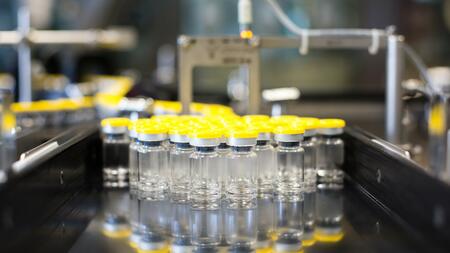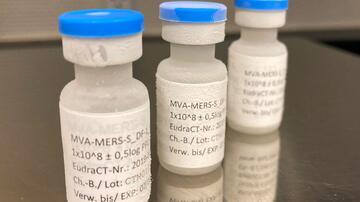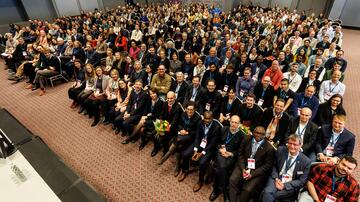Study with optimized vector vaccine MVA-SARS-2-S resumed
Optimized vector vaccine against corona shows good efficacy in preliminary tests.
The DZIF vector vaccine against Corona enters clinical trials again.
The clinical review of the MVA-SARS-2-S vector vaccine against COVID-19 will continue with a new version. The DZIF (German Center for Infection Research) scientists temporarily suspended the study programme after evaluating the Phase I data because the immune responses remained below expectations. The spike protein of the vector vaccine has now been modified to make it more available for detection by the immune system. The new vaccine candidate shows good results in preclinical mouse models and is able to induce an improved neutralizing immune response against SARS-CoV-2. Now 30 subjects are being sought to check the dosage of the vaccine, its tolerability and the immune response.
The team led by Prof. Dr. Gerd Sutter from the Ludwig Maximilian University of Munich (LMU) has made optimizations to the so-called spike protein of SARS-CoV-2 in order to achieve stronger immunization. "We are very confident that we are now testing an improved vaccine that will also result in satisfactory immune responses," explains Prof. Sutter, adding: "Last year, due to the pandemic and lockdown, it had not been possible in the first clinical phase to test a larger number of different formulations and variants of our vaccine in the first clinical phase. The administration of the complete spike protein as a vaccine will definitely continue."
As a vector for the vaccine, the DZIF scientists use a harmless, long-tested smallpox vaccine virus, the Modified Vaccinia virus Ankara (MVA for short). It serves as a transport vehicle for the genetic information of the SARS-CoV-2 spike protein. The vector vaccine delivers these instructions into the human body and causes the cells to recreate the coronavirus spike protein. This should then trigger a corresponding immune response with the formation of antibodies and T cells in the vaccinee’s body.
The new vaccine has been tested in animal models at the LMU and Philipps-Universität Marburg. "With the optimized vaccine, we see a significantly improved antibody response, which makes us optimistic for the phase Ib study that is now following," explains Prof. Dr. Stephan Becker, Head of the Institute of Virology at Philipps-University Marburg.
In this study phase, the UKE continues its cooperation with the CTC North clinical research organisation. "We are pleased that we can now continue the study and will soon start administering to the test subjects the first vaccinations with the optimized vaccine in three different dosages," says Prof. Dr. Marylyn Addo, Head of Infectiology at UKE, who is leading the clinical study as the principle investigator.
IDT Biologika GmbH from Dessau has taken on the technological development of the analytics as well as the production of the vaccine and also coordinates the preclinical and clinical activities for later approval. In the further course of the study, the study centres of the LMU University Hospital with Prof. Dr. Michael Hölscher and the University Hospital Tübingen with Prof. Dr. Peter Kremsner are to be included in the clinical review. The vaccine is one of three German projects that are financially supported by the Federal Ministry of Education and Research (BMBF) with a special programme.
Information about participation in the study
Subjects between the ages of 18 and 65 may participate in the study. The study includes a health screening, two vaccination appointments and 14 control appointments within a period of seven months. The volunteers receive an expense allowance for their participation. Those interested in participating in the study can contact the medical contracting institute CTC North: Email; Phone: +49 40 524719 111; www.ctc-north.com




